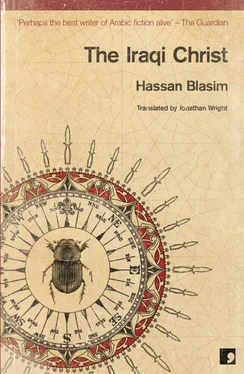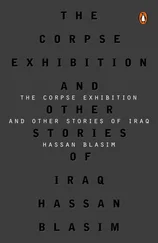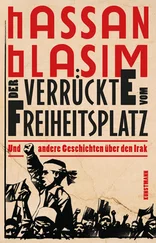3
Souad opened the door and a stout woman in her fifties, dressed in black, came in. She greeted us shyly. Salih the butcher stood up, made room for her on the bench and stood by the door. Jaafar asked him to sit down but he said he was fine.
Souad asked the woman, Umm Ibtisam, if she would like something to drink.
‘Thank you, coffee please,’ she said.
Jaafar tried to dispel the woman’s sense that she was unwelcome. He started talking about the high price of vegetables, deploring the fact that the country was importing vegetables from neighbouring countries when it had the two great rivers and plenty of fertile land. Then he jumped to the subject of the high price of gas and petrol when we had the largest reserves of black shit in the world. Souad brought Umm Ibtisam the coffee and went back to her place. She sipped the coffee and told Allawi she was in a hurry and had to get back to her children. It was Allawi who had found Umm Ibtisam. He said he was wandering round the old lanes in the centre of Baghdad when he noticed a shop that sold only knives of various shapes and sizes. He went into the shop and started to browse through the knives. A woman in her fifties came up to him and offered to help. He told her he was looking for a small knife he had lost years before, with a handle in the shape of a shark. The woman gave him a puzzled look and said her knife shop was not a lost property office. Allawi pre-empted her, as he put it, by asking if she knew about making knives disappear. She said she didn’t know what he meant and offered him a small knife with a snake wrapped around the handle. Allawi examined it and told the woman he knew how to make it disappear.
He sat in the middle of the shop and after thirty seconds of concentration and two tears, the knife disappeared.
The woman was upset and asked him to leave at once.
Allawi left and went back the next day. He said he only wanted to talk to her but she didn’t want to listen. Maliciously and threateningly, Allawi told her that he could make all the knives in the shop disappear at once.
The woman pulled a large meat cleaver off one of the shelves and brandished it in Allawi’s face.
‘What do you want, you evil boy?’ she cried.
‘Nothing. Just to talk.’
Allawi sat cross-legged on the floor and asked her if she would like to see another demonstration of making knives disappear. She didn’t reply, just stared at him suspiciously and held the cleaver in her hand. Straight off, Allawi started telling her about the gift of making knives disappear and reappear and about our group. This was very stupid of him, because we were wary of talking about the group to outsiders, but Allawi had spent a long time in the market and thought nothing of showing off in front of others.
Allawi said, ‘The woman’s face turned the colour of tomato when I talked about the knife trick. She sat on a chair in front of me and put the cleaver on her lap. Then she started to weep in anguish.’ Then she suddenly stood up, closed the shop door, wiped away her tears and told him the story of the knife shop, after making him promise never to reveal her secret.
The woman had five daughters and her husband had been killed when a car bomb exploded in front of the Ministry of the Interior, cutting his body in half. It was a disaster. The woman had no idea how she could support her daughters. Her grief for her husband broke her heart and disrupted her sleep. She had nightmares in which she saw an enormous man slaughtering her husband with a knife. The nightmare recurred often, and every time the man would slaughter her husband with a different knife. Umm Ibtisam told Allawi she couldn’t understand why the knives appeared in her dream.
A month after the nightmares started, Umm Ibtisam came across a knife in the back garden of her house. It was an old knife. She contacted her brother because she was alarmed by its sudden appearance. Her brother started to ask the neighbours about it but they denied it was theirs. The knife aroused his interest. He said it looked like an antique. He calmed his sister down and told her he would ask his oldest son to stay a few nights with her and her daughters. The man came back a week later with a large sum of money, after selling the knife in the antique market. He told her the knife was valuable and dated from the Ottoman period. The brother joked with the woman, saying, ‘Let’s hope you find other knives and make us really rich.’
Umm Ibtisam said the nightmares then stopped. But in the same place in the garden six knives appeared, in this case kitchen knives. Umm Ibtisam kept the knives and this time she didn’t tell her brother. The knives continued to appear and in the end she told him. He didn’t tell anyone the secret of the knives because they were waiting to see how long they would continue to appear in the garden. They carried on appearing, but it was rare for an old one to turn up. Once, a knife dating from the Abbasid period turned up and her brother sold it on the black market for a large amount. He told his sister that God was providing a livelihood for her and her daughters because her husband had been killed without good cause. He suggested opening a shop to sell the knives. The brother rented a small shop close to her house, and so Umm Ibtisam started selling knives.
Umm Ibtisam asked Jaafar to swear to keep her secret because this was her livelihood. She added nothing to what she had told Allawi, who had invited her to attend our meeting. Jaafar swore to God and on his honour that he would keep her secret, and invited her to join the group. But she didn’t take up the offer, because all she wanted was for us to leave her alone. Souad embraced Umm Ibtisam, with tears in her eyes, perhaps for the strangeness of life’s agonies.
Souad took her to the door and handed her a bag full of cake, saying, ‘A simple present for the girls.’
None of us said anything. So there were knives appearing in other places. That meant the plot had thickened.
We were all smoking — Jaafar, Salih, Allawi and I, even Souad who had slipped a cigarette out of my packet, although she didn’t normally smoke. We noticed the thick cloud of smoke in the room and burst out laughing together. Jaafar began to cough like a decrepit old man. We took out our knives and started to play. I told them about the earliest book on the interpretation of dreams, which appears on a tablet from the Sumerian city of Lagash. The story goes that Gudea, the ruler of Lagash, was praying in the temple when he suddenly fell asleep.
‘I’m off to work,’ said Salih in his effeminate voice and left.
4
A year after I graduated from the Faculty of Education, Jaafar the referee suddenly disappeared. We didn’t leave a hospital or police station unsearched. We contacted people who had ties with some of the armed groups and kidnap gangs. But to no avail. The ground seemed to have swallowed him up, along with thousands of others in the country. Souad was in her second month of pregnancy and had postponed her studies at the Faculty of Medicine. I was very worried about her. She was frustrated and sad, like a bird whose wings have been broken in a storm.
The kids in Sector 29 were also sad that Jaafar had disappeared. They organised a football tournament by themselves for teams from the other sectors and called it the Referee Jaafar Tournament. They sent me an invitation to referee in the final.
The days passed slowly and sadly, like the miserable face of the country. The wars and the violence were like a photocopier churning out copies and we all wore the same face, a face shaped by pain and torment. We fought for every morsel we ate, weighed down by the sadness and the fears generated by the unknown and the known. Our knife trick was no longer a source of pleasure, because time had dispersed those mysterious talents of ours. We had been broken one after the other, like discarded mannequins. Our group had fallen apart. There were no more meetings or discussions. Hatred had crushed our childish fingers, crushed our bones.
Читать дальше












